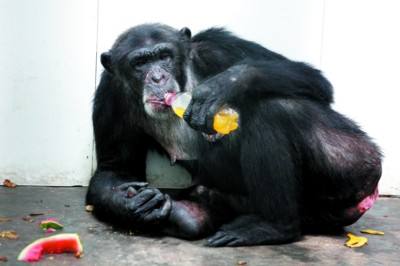(单词翻译:单击)
听力文本
This is Scientific American — 60-Second Science. I'm Jason Goldman.
Imagine you had never tasted lemonade. You would still probably assume that lemon juice mixed with sugar tastes better than lemon juice alone. Because you know what lemons taste like, and you know what sugar tastes like.
You can recall those past experiences, and make a prediction about your response to something new. Researchers call the ability to predict our future emotional state "affective forecasting." And some have suggested that the skill is unique to humans. But is it?
"We combined different liquids and asked participants, the orangutan and the humans, to predict how such novel liquid combinations taste like, and whether they prefer one or the other." Lund University cognitive scientist Gabriela-Alina Sauciuc.
She and her colleagues offered their cocktails to a 21-year-old male Sumatran orangutan named Naong, who lives in Sweden's Furuvik Zoo. They used four ingredients—cherry juice, rhubarb juice, lemon juice, and diluted apple cider vinegar—which they combined into six unfamiliar mixtures. Altogether, that made for 24 possible comparisons of one drink against another.

Naong watched the researchers mix his drinks. Then he got to choose from the two set before him. And in 21 of the 24 trials, Naong matched the researchers' predictions: that his choice would be based on his relative fondness for the separate ingredients.
For example, since he liked rhubarb juice better than lemon juice, he also preferred rhubarb-cherry juice to lemon-cherry juice—despite having had no experience with either.
"We were impressed with Naong's ability to be so consistent in his choices."
From a statistical perspective, the orangutan data was indistinguishable from human data. Both species seemed to make consistent choices about future events even if they had no prior experience to guide their decision-making.
"An ability which was previously thought to be uniquely human presumably has evolved earlier, so that it's shared with orangutans and presumably with chimpanzees as well."
It's a single study with a single orangutan. But it may be that we will soon mark yet another skill off the list of things that were once thought to be the sole domain of our species. Perhaps what's truly unique about us is our ongoing quest to find something unique about us.
Thanks for listening for Scientific American — 60-Second Science Science. I'm Jason Goldman.
参考译文
这里是科学美国人——60秒科学。我是杰森·古德曼。
假设你从未尝过柠檬汽水,但你或许仍可以推测出柠檬汽水加糖比单喝柠檬汽水要好喝。因为你知道柠檬是什么味道,也知道糖是什么味道。
你可以回忆过去的经验,预测一下你对于新事物会有什么反应。研究人员将这种预测未来情感状态的能力称为“情感预测”。一些研究人员认为这种能力是人类特有的。但是真的是这样吗?
“我们将不同的液体混合,让猩猩和人类等参与者来预测这种新型液体的味道,以及他们偏爱哪种组合。”加布里埃拉·艾琳娜·索西尤克是隆德大学的认知科学家。
她和同事将制作的混合液体给名为Naong的21岁雄性苏门达腊猩猩品尝,这只猩猩住在瑞典富鲁维克动物园。他们用了4种原料,分别是樱桃汁、大黄汁、柠檬汁和稀释的苹果醋,他们将这些原料和6种不常见的混合物组合起来。他们一共可以制成24种不同的饮料以进行比较。
Naong看着研究 人员混合饮料。然后它从自己面前的两排饮料中进行选择。在24次试验中,有21次Naong的选择和研究人员的预测一致:它会选择它比较喜欢的原料。
比如,比起柠檬汁,它更喜欢大黄汁;比起柠檬樱桃汁,它更喜欢大黄樱桃汁,尽管它从未尝过这两款饮料。
“我们对Naong如此一致的选择能力感到非常吃惊。”
从统计数据来看,猩猩的数据和人类的数据没有区别。如果没有先前的经验对做决定进行指导,这两个物种对于未来的选择是一致的。
“此前这种能力被视为人类所特有,而这种能力的进化时间可能要更早,所以猩猩也具有这种能力,而且可能黑猩猩同样有这样的能力。”
这是针对一头猩猩所做的单独实验。但是不久之后曾经被视为我们人类所特有的能力可能又会减少一项。也许我们人类真正独一无二的能力是我们可以继续寻找自身独特的事物。
谢谢大家收听科学美国人——60秒科学。我是杰森·古德曼。
译文为可可英语翻译,未经授权请勿转载!
重点讲解
重点讲解:
1. be unique to 独有的;特有的;
例句:The custom is unique to the region.
这种风俗是这一地区特有的。
2. be based on 以…为基础;
例句:The book is based on personal experience.
本书是以个人经历为基础的。
3. even if 即使;尽管;纵然;
例句:Even if you failed again, you shouldn't give up.
即使你再次失败,你也不应放弃。
4. share with 共享;共有;合用;
例句:He shared with his friends in distress.
他和朋友共患难。


